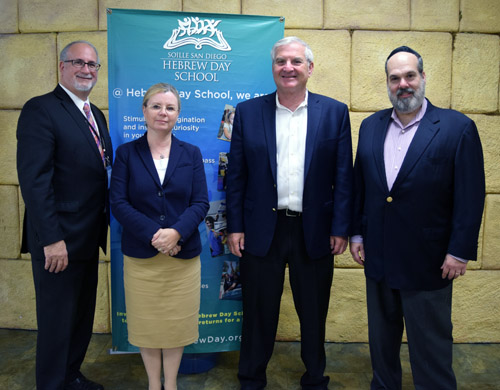
By Donald H. Harrison

SAN DIEGO – The teacher sets up a buffet of delicious, healthy foods in the classroom and after the students finish their surprise lunch, the teacher asks a deceptively simple question: “What did you eat?”
But he or she is not looking for the items that would be listed on a menu; instead the teacher is inquiring what micro-organisms did the students ingest and how can they go about identifying them?
This is a fairly typical exercise offered through a nationwide network of Jewish schools by the Center for Initiatives in Jewish Education (CIJE), which has developed 24 academic modules for the teaching of mathematics and science and emphasizing engineering skills.
On another day, the same teacher might place a nickel or a dime on a table and ask the students to figure how thick that coin would be when calculated to the 64th power. According to CIJE President Jason Cury, who visited Soille San Diego Hebrew Day School last Thursday, the answer works out to an object four light years in length.
At the middle school level, offered Rabbi Simcha Weiser, the Soille headmaster, an exercise might be to ask students to construct from only eight sheets of newspaper a table capable of supporting a book. Soille sixth graders, in fact, recently did such a project under the guidance of highly regarded science teacher Matt Bessler, who was named by the Greater San Diego Science and Engineering Fair as its 2016 teacher of the year.

CIJE, a non-profit organization founded by the philanthropic Gruss Life Monuments Fund, has programs in San Diego for Jewish middle school and high school students. In addition to Soille, where classes go through the 8th grade, CIJE works at the high school level with such institutions as the San Diego Jewish Academy, Southern CA Yeshiva High School, and Torah High School of San Diego.
In an interview in Weiser’s office, Cury told San Diego Jewish World that students are encouraged to problem solve on their own, or in groups, and to call upon their teachers only when their knowledge can take them no further. He added that students on their own have developed some amazing inventions as “capstone projects” at the high school level.
For example, he said, one team of three students developed a seeing-eye cane for blind people, which spotted curbs and other barriers to pedestrians and signaled that information to the cane’s user.
A California team, concerned about saving water, noted that many people leave their showers running until the water heats up to the desired level. So they developed a device that monitors when the temperature gets to that level, and then pauses the water flow, until the user is actually ready to take a shower.
A team in Florida, concerned about school shootings, was able to persuade a chip manufacturer in New York to donate a chip for a monitoring station that could electronically sense chips that might be inside guns. When the monitoring device sensed a gun near the campus, it would electronically shut down the campus and initiate a telephone call to the police. The team even talked with a member of Congress from Florida about introducing legislation to require all gun manufacturers to install such chips for the purpose of promoting gun safety. No word yet on the status of such legislation.
Cury said there are 185 Jewish elementary, middle, and high schools currently included in the CIJE network. Each school pays between $3,000 and $6,000 for the materials and the back-up support for their teachers. Scientists and engineers whose services might be too expensive for any single school make regular visits to the schools in their areas and also provide advice and counseling via telephone and email to the school teachers.
Jane Willoughby, who is CIJE’s vice president and West Coast director as well as a former K-12 director for advancement in science, technology, engineering and mathematics at San Diego Jewish Academy, said one of the advantages CIJE-affiliated schools have is that they “become part of the family – a family of schools. We have our teachers go into training programs in cutting edge areas, often where they don’t have that skill. It could be coding, or engineering, or another skill, and when they go back to school, we continue to support them for the rest of the academic year. They can email or phone and the mentor will come to the school.”
Rabbi Weiser said when Soille San Diego Hebrew Day School became involved with CIJE in 2005 it had 220 students. Now its enrollment in K-8 is 370 students. He credited CIJE for a large share of that growth because parents know their children can receive a well rounded secular education along with a religious education.
*
Harrison is editor of San Diego Jewish World. He may be contacted via donald.harrison@sdjewishworld.com.